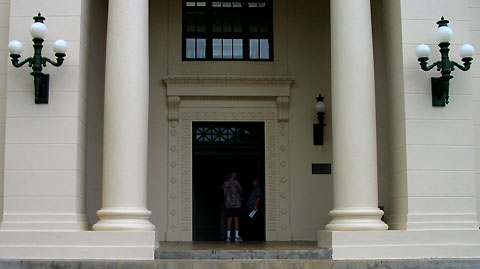editorial in the Florida Herald Tribune 29 May 2007
Making local boards more user-friendly
The vague and lackadaisical way that public meetings are often conducted can frustrate anyone who watches local government at work.
When commissions or councils vote, citizens can be left in the dark as to what the vote was about and why board members voted the way they did.
That is sloppy democracy.
The Venice City Council, to its credit, set aside time at its annual Strategic Planning Session this spring to make a list of ways to improve its meetings.
As mundane as that might sound, many public officials throughout the region -- as well as their constituents -- might benefit if Venice's to-do list became standard operating procedure. Some local boards already observe these practices, but too many of them do not.
Among the common-sense items are:
Speak English: Talk in plain language. Abolish the use of acronyms and other forms of government-speak. Gov. Charlie Crist has ordered state workers to trash jargon and his office has a helpful handbook, which is available online at:
http://apd.myflorida.com/docs/two-way-conversation.pdf
State the motion: Some clerks have to sort through the verbiage of the written minutes and craft a motion after a vote is taken. A full motion should be read before a vote is taken.
Explain the issue to the audience: When making land-use decisions, in particular, elected boards frequently rush the issue to a vote with little or no explanation to the public. Again, explain it in clear terms.
Explain votes: The public wants to know why an elected official is voting as he or she is on a substantive issue, and often the reasoning is not made clear in the board's discussions. A long speech is not necessary -- just a statement of why the person is voting "yes" or "no."
Be civil and respectful: Be nice to each other, to the public and to other public officials. Don't interrupt. No name-calling or eye-rolling. Obey the cliché: Disagree without being disagreeable.
Quickly, tactfully correct mistakes: If a fact is misstated by mistake or otherwise, find a way to quickly, politely correct the public record. Out loud.
Also, elected officials should keep in mind that the process by which a decision is reached can be as important as the decision itself. All the rules of order in the world won't matter if elected officials do not value openness and accountability in conducting the public's business.
Local governmental bodies should strive for good work habits and an open decision-making process. That is the least that the public should be expect from its leaders.
For more in formation:
Ken Taylor
phone: (808) -828-1602
email: taylork021@hawaii.rr.com
|
